- Home
- Thomas Harris
Cari Mora Page 14
Cari Mora Read online
Page 14
“You are taking care of your aunt?”
“My cousin and I, yes. When we’re both working we pay a sitter during the day. Don Ernesto, I know who you are.”
“And I know what happened to you in Colombia, and I am very sorry for that,” he said. “Cari, I am here as a friend of Antonio and I want to be a friend to you. You worked for years at the house of Pablo. You must know it well, its systems.”
“I know it well.”
“And you know Hans-Peter Schneider’s men by sight?”
“I do.”
“And the neighbors are accustomed to seeing you?”
“I know some of them, and the people who work at the houses.”
“Service people, they arrive there and they are accustomed to you greeting them?”
“Yes.”
“I offer you a job with a big benefit for your aunt. What is the nicest care facility in Miami? The very best one?”
“Palmyra Gardens,” she said.
“I want you to consider what I’m going to say as a present from Antonio and an opportunity for you. I’m offering you a scholarship for your aunt to Palmyra Gardens for as long as she needs it, and I offer you a share in whatever we might recover at the house.”
A tough old frangipani in bloom over the table attracted bees to its blossoms. The bees made a faint humming overhead.
Cari missed her dead father, she missed the old naturalist she had guarded in the forest. She wished for a steady place to lean for counsel. She looked at Don Ernesto, tempted to follow him.
But she did not see her father in Don Ernesto’s face, nor did she see the old naturalist. Above her she heard the bees.
“What would I do?” she said.
“Watch out for me, is one thing,” Don Ernesto said. “A woman killed Jesús Villarreal with a bomb. The best defense against a woman is a woman. I need your eye to watch my back. I need your knowledge of the house.”
The crow waited impatiently, walking up and down the limb. Cari thought Don Ernesto’s eyes looked much like the crow’s eyes.
It was obvious to Don Ernesto that Cari did not have great papers, that she was probably staying in the U.S. by the skin of her teeth with a Temporary Protected Status. The U.S. president could cancel everyone’s TPS at any moment in a fit of pique, if the president knew what a TPS was.
Cari could sell out Don Ernesto and the gold to ICE at any time, in exchange for good papers and a fat reward. She hadn’t done it so far…better to have her inside the tent.
Don Ernesto smiled when the crow muttered at him. He thought about what was coming, the long ache of tension, the smell of fear in a closed and dangerous place. What the fuck, Carmen, he thought to himself. She will be useful.
“Cari, do you want to bring your cockatoo?” he said.
Chapter Thirty-Two
The Escobar house was quiet. The movie mannequins and action figures looked at each other across the rooms of draped furniture.
Without Cari Mora to adjust them, the automatic blinds, which used to go up in the morning and come down in the hot afternoon, remained mostly in the down position, running up and down at random with their timers awry. They made twilight in the house for most of the day. The sprinkler system turned on and off several times in an hour.
Shortly before daylight a tree rat pushed open the cabinet under the sink from the inside and, staying close to the wall, found and ate the spilled seed on the floor from the absent cockatoo.
At first light Cari Mora got out of a landscape truck at the front gate and poked in the access code. The gate swung open and Marco drove in with his crew, Ignacio and Esteban along with Benito and Cari.
Gomez was in a second car parked a block away with Don Ernesto.
“Better keep your mouth open a little bit, Gomez, in case there’s a loud noise and a pressure wave,” Don Ernesto said.
Bobby Joe’s truck still stood in the driveway near the front door.
The truck’s windows were down and one door was open, as though it was still waiting for Bobby Joe. It had rained in the night and the truck was wet inside.
Cari looked at the truck. Sitting there wet, it was about the same color as Bobby Joe’s brains.
They piled out, armed, with their pockets full of doorstops. Standing on each side of the front door, they tried the lock. Locked. Cari had the key. They shoved open the door and covered Cari while she checked the alarm panel. All off. She turned on the motion sensors upstairs.
“Watch the doorways for trip wires,” she said.
Esteban held up a pressure can of jock-itch powder.
Cari shook her head. “No beams in here.”
They moved around the side of the house, staying low beneath the windows. A side door stood open. The tree rat heard them coming in and disappeared back under the sink, leaving the cabinet door ajar.
They cleared the downstairs, room by room, yelling “Clear!” as each space was found empty.
They heard something upstairs, a voice. They watched the motion sensor lights but nothing was moving upstairs. Cari shut the alarm off and Esteban set up to cover the big staircase. Marco and Cari went up fast, Cari carrying the AK-47 at the low ready, using the sling.
In a small bedroom upstairs they found the marks of a swift departure. Some clothes abandoned, a TV on. A wasp had flown in the open window and now batted against the ceiling.
The only empty bedrooms were the master, where Hans-Peter had slept, and the room Mateo had used. The other rooms held scattered belongings of the dead: a shaving kit, a pair of burglar shoes with a stud finder taped to one toe.
Leaning in the corner of a bedroom was the AR-15 of the late Umberto, who put Antonio’s head in the crab trap and tried to drown Cari.
In the pool house Marco found the harness Felix had worn when he went into the hole. The straps were crusted with blood and sand. Marco looked at it for several minutes. Drag marks in blood led to the dock. He sent Esteban to hose the blood out of the pool house.
Marco went to the basement room and stood on the stairs looking at the face of the cube. His instructions were to leave it alone.
The life-size image of the Nuestra Señora de Caridad del Cobre, vivid on the vault door, made the room feel like a chapel. The struggling boatmen were painted on the sea in front of her. A fresh curl of metal hung from a shallow hole drilled in the saint’s side. The big drill lay on the floor.
Captain Marco looked at the desperate boatmen in the Virgin’s care and crossed himself.
Don Ernesto was waiting in his car. His telephone rang. Antonio’s telephone was calling. He looked at his phone for a moment before he answered it.
“So you have the house,” Hans-Peter Schneider said. “I can send the brass there in five minutes.”
“Unless I do what?” Don Ernesto said.
“Give me one-third, that’s very reasonable.”
“Have you got a market?”
“Yes.”
“Your market will show me cash?”
“Or a wire transfer anywhere you like.”
“All right.”
“And there’s one other thing I want.” Hans-Peter whispered his heart’s desire.
Don Ernesto closed his eyes, listening.
“I can’t do that,” he said. “I cannot do that.”
“I don’t think you understand yourself, Don Ernesto. For two-thirds of twenty-five million dollars, you would do anything.”
The phone went dead.
Chapter Thirty-Three
In the basement of the Escobar house, Favorito in his VA wheelchair sat at a card table studying the scanned copies of the documents and drawings given to Don Ernesto by the widow of Jesús Villarreal. One of them was a labeled sketch of the cube. Favorito had a stethoscope around his neck and a small box of tools. Several photography floodlights lit the life-size image of Nuestra Señora de Caridad del Cobre on the front of the vault.
With Favorito in the small room were Marco and his first mate, Esteban.
There was a stir, hats off and murmured greetings as Don Ernesto appeared on the stairs. He raised his hand in benediction and greeted them all at once. With him were Gomez and Cari.
Cari nodded to Marco and Esteban.
Don Ernesto stood at the table and put his hand on Favorito’s shoulder.
“Hola, Patrón,” Favorito said. “Is this everything you got from Señora Villarreal? Did Jesús talk specifics to you?”
“I only got the paper after his death, Favorito. Just before I scanned it for you. Here is the original. It’s not much better than the scan.”
They unrolled the papers on the table.
“In the photos, the cube looks like 340L stainless steel to me, so it’s more than five inches thick,” Favorito said. He traced his finger over the drawn diagram. “Here’s the explosive charge, this I think is a photoelectric cell, probably diffuse so any light will trip it the minute you punch through the box. You don’t have to break a beam to set it off.”
“Wouldn’t a cell take batteries? It’s been a long time,” Marco said.
Favorito tapped the papers. “Probably we’ll find a power source, maybe under the patio lights, charging batteries in the box. Patio’s on a timer, right?”
Cari answered from the stairs. “Yes, a timer. The system’s on a double twenty-amp circuit breaker in the pantry. The lights are on from seven to eleven. They were only out four days during Hurricane Wilma.”
Favorito looked around, a little startled to hear a young woman’s voice.
“This is Cari. She is okay,” Don Ernesto said.
“Cari,” Favorito said. He pointed at the image on the vault door. “Caridad del Cobre, any connection I hope?”
“Not enough,” Cari said.
“This looks like a drawing from hearsay,” Favorito said. “No details. No wiring diagram. Here’s a bad drawing of the art. With some spots marked ‘imán.’”
“Imán: magnet,” Don Ernesto said.
“I think we have to look at the back side, see if it has a soft spot,” Favorito said.
“Could we punch on through from here, go beside the box?” Esteban asked.
“I don’t think it’s a good idea to shake it until we know more,” Favorito said. “To get through the concrete and rebar around the sides would take what?”
“Two days, if we go all night,” Esteban said.
“We need to look down there. I’ll go,” Captain Marco said. Marco felt he had sent Antonio to his death. He was glad to test himself.
Don Ernesto’s telephone vibrated. He looked at it and walked outside. He went into the pool house. The blood had been hosed out but Antonio’s blood stained the grout. The grout was maroon now. Small ants swarmed on it.
Diego Riva, the lawyer of Jesús Villarreal, was calling on a patch through Don Ernesto’s office in Cartagena.
“Don Ernesto,” Riva said in his best friendly voice. “It was a pleasure seeing you yesterday, despite the sad circumstances. I tried your office. Are you in Cartagena? We need to talk.”
“I’m away on business. How can I help you, Señor Riva?”
“I want to do you a favor, señor. I expect in the near future you will utilize the information Señora Villarreal provided at such peril to herself.”
“Yes, I expect so,” Don Ernesto said, sticking his tongue into his cheek.
“I have made a disturbing discovery here. I am informed that one of your business competitors, while making a cursory examination of the material, made an alteration in the documents. It could affect your safety, and I am concerned for you. It is vital the material be restored to complete accuracy, for your own safety.”
“I appreciate your contacting me so soon,” Don Ernesto said. “What is the alteration? I can give you a fax number here, or you can scan it and send it to my telephone.”
“I would prefer to meet with you in person,” Riva said. “I’ll happily come to Cartagena. Don Ernesto, this project has put me in considerable peril, not to mention the problems of dealing with the señora and her sister, who is difficult to say the least. I would hope you would provide me with a gratuity. I think a million dollars would be fair.”
“Caramba!” Don Ernesto said. “A million dollars is quite a gratuity, Señor Riva.”
“You need this information. Your men’s lives depend on it,” Riva said. “Many men less honorable than I might consider a reward from the authorities.”
“And if I don’t pay?”
“When you have time to reflect, months into an uncertain future, when others have profited, hindsight will show you your mistake.”
“Señor Riva, would you consider $750,000?”
“I’m afraid my price is firm.”
“I’ll be in touch with you very soon.” Don Ernesto ended the call.
He summoned Gomez and discussed Diego Riva and his phone call. “He warns of the sadness that can come with hindsight,” Don Ernesto said.
“Yes, hindsight,” Gomez said. “Hindsight.”
“If I pay him, Gomez, he will then sell us to ICE after he has our money. I would like to arrange a meeting at Jesús’s grave. I’d like for you to help him improve his hindsight. Do you remember in the movie how Dracula turned Renfield’s head around backwards?”
“Yes,” Gomez said, “but I’d like to review it on On Demand. Is it all right if I employ my uncle to assist me? He’s very capable.”
“Yes. Go as soon as this is done,” Don Ernesto said.
“Sí, Patrón, but your security—”
“I’ll keep someone with me.”
“Of this group? Señor, if I might recommend, whoever of the men you take, also take the girl. I think she is very capable. I am a good judge of these things. Remember, it was a woman who killed Jesús.”
Don Ernesto did not tell Gomez that there might be fatal alterations in the diagrams of the vault. And he never told Favorito and he never told anybody.
If Diego Riva ratted them out it would spoil the market for the gold in Miami, which is usually an easy place to move illicit gold. The feds and the SEC would be watching for it and they would be all over the local smelters. Jesús had said some of the bars were numbered. The gold had to go out of the country to be recast. It could not be moved in the box if the box had motion sensors.
What was the worst that could happen if it blew up? No witnesses, no evidence, a lot of collateral damage up and down the street. He would lose some good people, but outside of that, nothing really serious.
So. They had to open the box here and do it soon. They had to move the gold before Diego decided to inform the police.
Don Ernesto made a call to Haiti. At Port-de-Paix Airport a man in brown overalls answered the telephone. He was cleaning the fuel filters in an airplane sixty years old. He spoke briefly with Don Ernesto and then Don Ernesto ordered five hundred pounds of cut flowers and three washing machines.
Chapter Thirty-Four
The big market umbrella over the hole was for cover from patrolling police and Coast Guard helicopters as much as for shade from the sun.
Shortly after daylight Captain Marco emerged from the pool house wearing a new lifting harness. He carried Felix’s harness, crusted with blood and dried silt, and dropped it on the tiles around the pool.
Don Ernesto put his hand on Marco’s shoulder.
“You don’t have to do this yourself. I can bring up a diver.”
“I sent Antonio down there. I’ll go myself,” Marco said.
“Sí, Capitán,” Don Ernesto said.
Ignacio came out of the house with a small suitcase and a backpack. He dumped the contents on the ground.
“Dead guys’ stuff,” he said. “Some grass, mostly seeds and stems, in the suitcase, a Leatherman tool, a jerk-off—” Ignacio remembered Cari behind him “—ah, this magazine here, Juggs Triple DDD, and some shaved dice, and—believe this?—a corduroy whip cup to shoot craps. He was not ready for Miami. That thing would get him killed in this town. I’ll get rid of it.”
Marco stepped under the umbrella as a Coast Guard helicopter passed over.
Benito joined him under the canvas. The old man opened the rod case he was carrying.
He handed Marco a diver’s bang stick about five feet long.
“In case you need to make some noise,” Benito said. “My nephew made this for you.” He held a round of ammunition in his palm. It was sealed with wax. “This is a loaded .30-.30 cartridge reversed butt-forward with a .357 cartridge in the neck where the bullet used to be. Like this. I think you want to load it yourself.”
Marco tested the safety on the bang stick, then chambered the round in the end of the weapon.
The .357 round would propel the entire .30-30 cartridge case like a long bullet with its own flaming charge into anything Marco jammed it against.
Benito and Marco bumped forearms.
“Let’s go,” Marco said. “I’m burning up in this thing.” He put on a mask with two charcoal filters and a video camera. Marco looked at Favorito, checking the streaming image on his laptop. Thumbs-up. They bumped forearms.
Lowered into the dark cave with the hand winch. Little jerks as he went down. Marco looked around with his flashlight. The air was thick and warm on his cheeks.
“Down a little, down a little.” He extended his feet. “Down, down.” He touched bottom. The water was waist deep, the surge up and down not more than a foot. Marco shined his light on the cube, on the human skull, on the chandelier of roots coming through the ceiling of the cave. He could feel the surge from the underwater entrance pull at his ankles. He made a rough measurement with the bang stick.
“The piers are far enough apart so we can drag the cube between them if we get the winch on it.” He waded forward, snuffling inside his mask, having to bend low, almost submerge to get under some roots. “The gravel barge is sticking out of the water, but it’s not in the way.” He reached the cube and the skull beside it. In the shallows near the cube was an eighth of a dog.

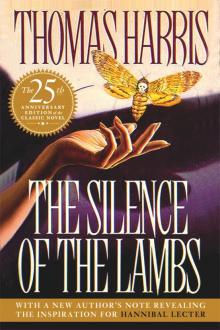 The Silence of the Lambs
The Silence of the Lambs Red Dragon
Red Dragon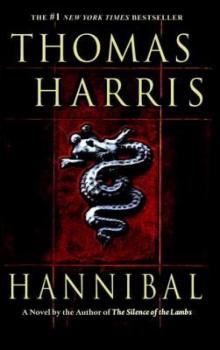 Hannibal
Hannibal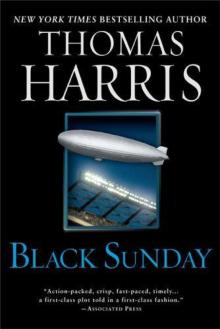 Black Sunday
Black Sunday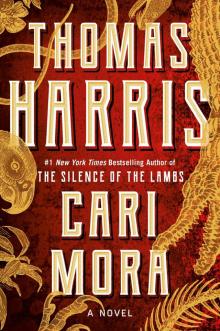 Cari Mora
Cari Mora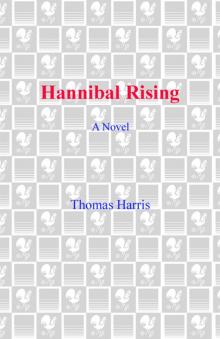 Hannibal Rising
Hannibal Rising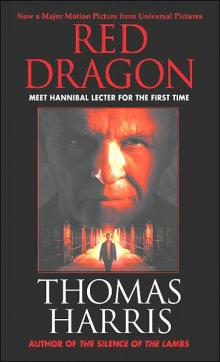 Red Dragon hl-1
Red Dragon hl-1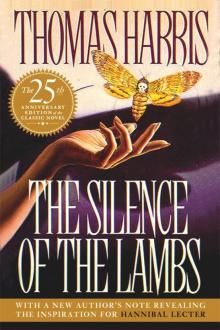 The Silence of the Lambs (Hannibal Lecter)
The Silence of the Lambs (Hannibal Lecter)